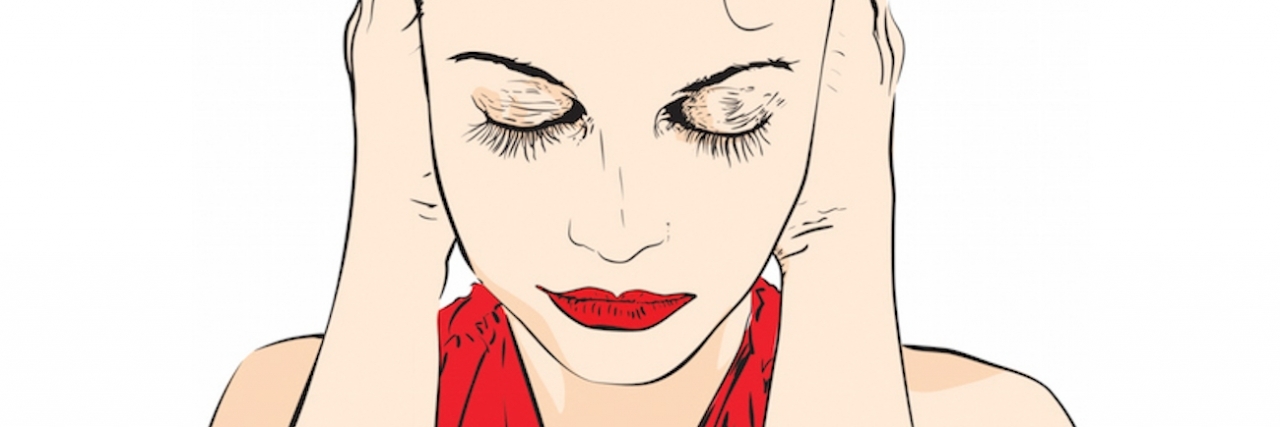What It's Like Being Diagnosed With Generalized Anxiety Disorder in Your 20s
I held the slip of paper in my hands.
We had waited two hours at the clinic for an appointment that lasted about 10 minutes. It felt like it spanned another two hours, though. This memo I had received at the end of the appointment might just be the answer to the past two and a half years of endless questioning, doubt and periods of emotional intensity that alternated with emotional blankness.
Two years prior, I was staying in a dorm while studying for a non-graduate diploma in education. Having been unable to enter the undergraduate program for education, I’d told
myself I had to excel in this diploma program — I was hoping to attain excellent grades that would permit me to continue into the undergraduate program upon completing my diploma.
Yet, as much as I tried, my two years studying for my teaching diploma were hardly as I’d envisioned. Instead of enthusiastically searching for new and creative ideas for lesson activities, I was mostly a perpetually exhausted mess. I was barely surviving on chocolate bars and tea for “lunch,” finding myself in a state of mental fog most of the time. Instead of making friends with fellow teachers-to-be and actively exchanging teaching philosophies or classroom management strategies, I mostly spent my time fretting over every essay submission, trying to balance that with managing laundry and regular changing of my room’s bedsheets.
While I’d managed to complete the diploma, I’d only done so very barely, almost through the skin of my teeth. Additionally, the stress of full-time teaching upon graduation only took a greater toll. At the end of my first term break, I was supposed to return to school. But I woke up that morning and found my feet were tingling while I was covered in cold sweat.
Following that, I’d called in to school to report sick, while texting a close friend to tell
her what had happened. She told me to head to the clinic nearest to my house, where she’d met me. As I stepped out of the doctor’s room at the end of the appointment, at long last after all that struggling and waiting, I glanced at the slip of paper:
“Provisional Diagnosis: Generalized Anxiety Disorder”
Reading those words simultaneously gave me relief and caused me more anxiety. Relief, because I could finally put a description to what I had been struggling with for the past two years — to know it was an issue with a name was of some strange comfort, as though it validated those periods of emotional messiness. Yet it was equally nerve-wrecking — what did having a named mental health condition mean for me?
I was a young, 20-something fresh graduate from teacher training, if only more edgy and easily stressed than the average person — how could I ever have a mental disorder, why on Earth was I given this memo for referral to mental health services?
Two and a half years post-diagnosis and several months of therapy later, I have now learned the roots of my anxiety disorder stem from early childhood experiences,
characterized by emotional insecurity and dysfunctional parenting. In the midst of these, I’d developed a terribly low self-esteem and a penchant for perfectionism. In hindsight, taking into consideration the extremely low tolerance I had for my own foibles, this anxiety disorder was a ticking time bomb waiting to explode, given how self-punishing I was towards my own inadequacies.
Admittedly, accepting this diagnosis was quite a struggle, as it occasionally continues to
be — in the first year of being diagnosed, I constantly questioned if I truly had an anxiety disorder, or whether it was something I made up in my head. It wasn’t that I doubted the legitimacy of this condition. Rather, I felt that having been given this label, I had to be “sick enough” to live up to it. In my opinion, holding down a full-time job was sufficient evidence I was not “sick enough,” even as I felt like I was drowning in my own anxiety struggles at work. At this point of writing, I’m still learning to overcome the self-stigmatization a label of an anxiety disorder brings. Yet, I am also slowly discovering that this label does not, and cannot, take away the things I treasure most — writing, words, music and faith, among other things.
Today, even as I’m thankful for the people who have helped me rebuild my self-esteem over time, such as my psychologist and the members of my church community, I am still very much a work-in-progress. While I have learned strategies that help me cope with the anxiety, recovery is never a linear process — more often than not, I still find myself succumbing to the anxiety and wondering if it will ever go away.
But I am learning to be kinder to myself and rejoice in my baby steps of progress, no matter how tiny.
For now, I am thankful I have found a coping mechanism in writing for various online
platforms, just how this submission itself was penned as a coping mechanism.
I may have an anxiety disorder, but I’m gradually learning it does not need to have me!
The Mighty is asking the following: Were you diagnosed with your disease, disability and/or mental illness as an adult? Tell us about the moment you finally got your diagnosis. Check out our Submit a Story page for more about our submission guidelines.

